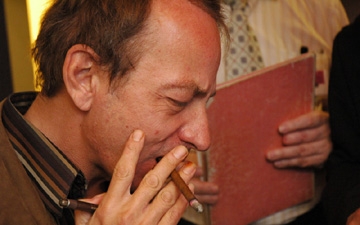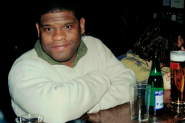Archives | Authors | Michel Houellebecq
Michel Houellebecq France PWF 2005

Houellebecq gained fame with the novel Extension du domaine de la lutte in 1994 (translated into English by Paul Hammond as Whatever), he won the 1998 Prix Novembre with his novel Les Particules Élémentaires (translated by Frank Wynne) and published as Atomised (Heinemann, UK) or, The Elementary Particles (Knopf, US). The novel became an instant "nihilistic classic". The New York Times, however, described it as "a deeply repugnant read." The novel won Houellebecq—along with his translator, Frank Wynne—the International IMPAC Dublin Literary Award in 2002. The author's following novel, Plateforme (2001), earned him a wider reputation. It is a romance, told mostly in the first-person by an aging male arts administrator, with many sex scenes and an approbation of prostitution and sex tourism. The novel's depiction of life and its explicit criticism of Islam and the Muslim faith, together with an interview its author gave to the magazine Lire, led to accusations against Houellebecq by several islamist organisations.
His most recent novel is The Possibility of an Island (translated by Gavin Bowd. Original title La Possibilité d'une île), is a novel that alternates between three characters' narratives, Daniel 1 (a current day comedian) and Daniel 24 and 25, neo-human clones of the Daniel 1. He has also released a music CD Présence humaine, on Bertrand Burgalat's Tricatel label in 2000, on which he sings over a rock band backing. Michel Houellebecq currently lives in Spain.

Michel Houellebecq: Not Casanova
25.01.2008 Interviews
When I got on the plane I realized that I’m traveling to a festival devoted to Casanova, and I found it slightly shocking. Well, I guess for you it has many connotations - it evokes a lot. Casanova was a famous seducer, and his name has actually become a term in everyday language, and, perhaps, there’s a slight dissonance because the heroes of my novels are not Casanovas. In Whatever, the first one hasn’t had sex for years, and is depressed about it. He keeps trying and trying and is depressed about failing, while the other is trying to seduce any woman he comes in contact with, but he’s ugly, he has no charm, and no success. He’s never actually seduced a woman. I guess, if those people thought of someone like Casanova, they would have been terribly jealous. They would hate him, perhaps they would even think of killing him. Anyway, it is difficult to imagine a piece of literature so unlike Casanova.

A platform for closed minds
25.01.2008 Articles
Salman Rushdie argues that Michel Houellebecq's Islamic opponents have miscalculated badly.

Agent provocateur
25.01.2008 Articles
Michel Houellebecq is the literary equivalent of a rock star - rebellious, adored and reviled - and a multi-millionaire. Andrew Hussey, who has known the controversial writer for more than a decade, joins his fans at a conference in Edinburgh to celebrate the publication of his new novel.

Michel Houellebecq: The Possibility of an Island
25.01.2008 Readings
How vividly I remember the first moments of my vocation as a clown! I was seventeen at the time, and spending a rather dreary month in an all-inclusive resort in Turkey-it was, incidentally, the last time I was to go on holiday with my parents. My silly bitch of a sister-she was thirteen at the time-was just beginning to turn the guys on.

Michel Houellebecq: The Elementary Particles
25.01.2008 Readings
The first of July 1998 fell on a Wednesday, so although it was a little unusual, Djerzinski organized his farewell party for Tuesday evening. Bottles of champagne nestled among containers of frozen embryos in the large Brandt refrigerator usually filled with chemicals.





-6507dcf8af9e0_160x60.jpg)
